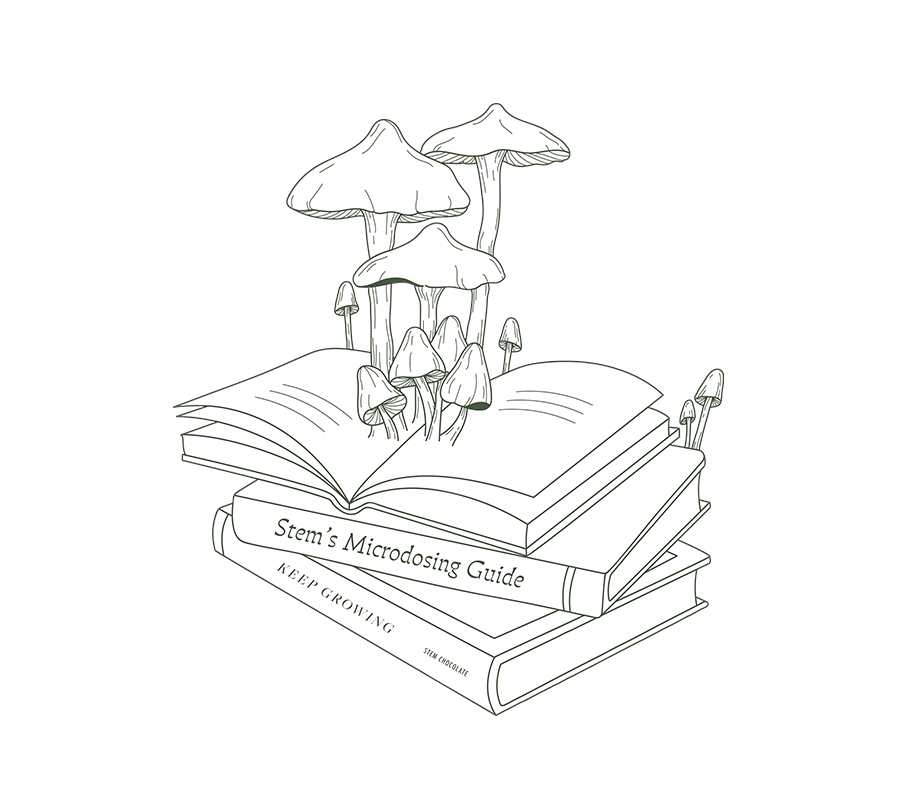Psilocybin is a naturally occurring psychoactive compound found in certain species of mushrooms, also known as “magic mushrooms.” It has been used for centuries in traditional rituals and has gained attention in recent years for its potential therapeutic benefits, with innovative products like magic mushroom chocolates bringing a new dimension to its use. But how does psilocybin compare to other psychedelics in terms of effects, medical uses, and legal status? Let’s explore further.
Similarities between psilocybin and other psychedelics:
- Psilocybin, like other psychedelics, can alter perception and produce hallucinations.
- They all work by interacting with serotonin receptors in the brain.
- They have potential medical uses in treating mental health conditions such as depression, anxiety, and PTSD.
- These substances have been used in traditional rituals and ceremonies for centuries.
Differences between psilocybin and other psychedelics:
- Psilocybin is found in mushrooms, while other psychedelics like LSD and MDMA are synthetic substances.
- The duration and intensity of effects can vary between different psychedelics.
- The potential risks and side effects differ between substances.
- The legal status and societal views of these substances also vary.
Effects of psilocybin on the brain and body:
- Psilocybin primarily works by binding to serotonin receptors in the brain, resulting in altered perception and mood.
- It can also increase neural connections and communication in the brain, potentially leading to long-term changes in behavior and thought patterns.
- Short-term effects include changes in perception, mood, time perception, and sense of self.
- Long-term effects may include improved well-being and decreased symptoms of mental health conditions.
Potential medical uses of psilocybin:
- Psilocybin has shown promise in treating conditions such as depression, OCD, and anxiety in clinical trials.
- It is also being studied for potential use in treating addiction, PTSD, and end-of-life anxiety.
- Psilocybin-assisted therapy involves pairing the substance with therapy to facilitate healing and personal growth.
Potential risks and side effects of psilocybin:
- While research has shown that psilocybin is generally safe, there are some potential risks and side effects, including nausea, increased heart rate, and anxiety.
- Psilocybin can also have negative effects on individuals with preexisting mental health conditions or those at risk for psychosis.
Legal status and societal perception of psilocybin:
- Psilocybin is classified as a Schedule I drug in the United States, meaning it is considered to have a high potential for abuse and no currently accepted medical use.
- However, some cities and states have decriminalized or legalized psilocybin for personal or medical use.
- Compared to other psychedelics, such as LSD, which is also a Schedule I drug, psilocybin has been less stigmatized and has gained more support for its potential therapeutic uses.
What is Psilocybin?
Psilocybin is a naturally occurring compound found in certain species of mushrooms. It is classified as a psychedelic substance, capable of altering perception, cognition, and mood. When ingested, psilocybin is converted into psilocin, which then binds to serotonin receptors in the brain, resulting in its psychedelic effects.
This compound has been utilized for centuries in various cultures for spiritual and therapeutic purposes. More recently, psilocybin has garnered attention for its potential in treating mental health conditions such as depression and anxiety. However, further research is necessary to fully comprehend its effects and potential benefits.
How Does Psilocybin Compare to Other Psychedelics?
Comparing psilocybin to other psychedelics involves considering various factors such as effects, duration, and legality. Here are the steps to understand how psilocybin compares to other psychedelics:
- Effects: Research the specific effects of each psychedelic, such as visual hallucinations with LSD or introspection with psilocybin.
- Duration: Compare the duration of the trip for each substance, with psilocybin typically lasting 4-6 hours compared to the longer duration of LSD.
- Legality: Understand the legal status of each substance, as psilocybin is still illegal in many countries while other psychedelics may have different legal classifications.
By considering these factors, one can gain a better understanding of How Does Psilocybin Compare to Other Psychedelics?
What are the Similarities Between Psilocybin and Other Psychedelics?
There are several similarities between psilocybin and other psychedelics in terms of their effects on the brain and body. These include:
- Altering perception
- Inducing hallucinations
- Enhancing introspection and self-reflection
Like other psychedelics, psilocybin activates serotonin receptors in the brain, resulting in its psychedelic effects. Additionally, psilocybin and other psychedelics have shown potential in medical research for treating mental health conditions such as depression and anxiety. However, it is important to note that each psychedelic compound has its own unique qualities and effects. Throughout history, various psychedelics have been utilized in indigenous cultures for spiritual and healing purposes.
What are the Differences Between Psilocybin and Other Psychedelics?
Psilocybin stands out from other psychedelics in several ways. To begin with, it is a naturally occurring compound found in specific species of mushrooms, while other psychedelics such as LSD are artificially created. Additionally, the effects of psilocybin are typically milder and more introspective compared to the intense hallucinations often associated with LSD. Moreover, psilocybin has a shorter duration of action compared to substances like ayahuasca. Furthermore, research has shown that psilocybin carries a lower risk of physical dependence compared to substances like MDMA. Understanding these differences can assist individuals in making informed decisions about their psychedelic experiences.
What are the Effects of Psilocybin on the Brain and Body?
When considering the effects of psilocybin on the brain and body, it is important to understand that it is a psychedelic substance that can cause significant changes in perception and consciousness. Psilocybin binds to serotonin receptors in the brain, resulting in effects such as hallucinations, mood alterations, and increased introspection. Physically, psilocybin can lead to dilated pupils, an increased heart rate, and changes in blood pressure. Due to its potential for both positive and challenging experiences, it is crucial to approach psilocybin with caution and in a controlled environment.
How Does Psilocybin Affect Serotonin Levels?
Psilocybin, found in magic mushrooms, interacts with serotonin receptors in the brain, resulting in changes to mood, perception, and cognition. This interaction with serotonin levels can be broken down into the following steps:
- Psilocybin is quickly converted into psilocin within the body.
- Psilocin attaches to serotonin receptors, specifically the 5-HT2A receptor.
- This attachment leads to an increase in serotonin activity in the brain.
- The heightened serotonin activity is believed to contribute to the psychedelic effects of psilocybin.
Fun Fact: Psilocybin has shown promising results in treating depression, with some studies suggesting that it may have long-lasting antidepressant effects.
What are the Short-term Effects of Psilocybin?
The short-term effects of psilocybin can vary from person to person, but common experiences include altered perception, changes in mood, and heightened sensory perception. Users may also experience spiritual or mystical feelings, intense emotions, and a distorted sense of time. Some individuals may have hallucinations or synesthesia, where the senses cross over. Physical effects can include dilated pupils, increased heart rate, and changes in blood pressure. It’s important to note that the effects of psilocybin can be influenced by factors such as set and setting, dosage, and individual sensitivity.
After consuming psilocybin mushrooms, Sarah reported feeling a deep sense of connection with nature and experiencing vivid colors and patterns. She felt a profound shift in her perspective, leading to a greater appreciation for life and a renewed sense of purpose. Sarah described the experience as transformative and believes it played a significant role in her personal growth and emotional healing.
What are the Short-term Effects of Psilocybin?
What are the Long-term Effects of Psilocybin?
The long-term effects of psilocybin include positive changes in personality traits, including increased openness, improved well-being, and decreased symptoms of depression and anxiety. Studies suggest that these effects can last for several months or even years after a single psychedelic experience. Additionally, psilocybin has shown promise in treating substance use disorders, with research indicating reduced cravings and increased rates of abstinence. However, further research is necessary to fully comprehend the long-term effects and therapeutic benefits of psilocybin.
What are the Potential Medical Uses of Psilocybin?
Psilocybin has displayed potential in various medical applications. Research indicates that it may be beneficial in addressing mental health conditions like depression, anxiety, and addiction. Additionally, studies have explored the use of psilocybin-assisted therapy for individuals with terminal illness, helping them manage end-of-life anxiety and depression. Moreover, psilocybin may have the ability to enhance creativity and facilitate personal growth. However, more studies are necessary to fully comprehend its medical benefits and establish safe and effective treatment methods. It is important to consult with healthcare professionals when considering the potential medical uses of psilocybin.
How is Psilocybin Being Studied for Mental Health Treatment?
Psilocybin is currently being studied for its potential as a treatment for various mental health conditions. Here are the steps involved in studying psilocybin for mental health treatment:
- Research design: Scientists develop study protocols to investigate the effects of psilocybin on specific mental health conditions.
- Participant recruitment: Individuals who meet specific criteria are selected to participate in clinical trials.
- Administration of psilocybin: Participants are given controlled doses of psilocybin in a supervised setting.
- Monitoring and assessment: Researchers closely monitor participants during and after their psilocybin experience to evaluate its impact on their mental health.
- Data analysis: The data collected during the study are analyzed to determine the effectiveness and safety of psilocybin for treating mental health conditions.
- Publication and peer review: The results of the study are published in scientific journals and undergo peer review for validation.
What Are the Potential Risks and Side Effects of Psilocybin?
The potential risks and side effects of psilocybin should be carefully considered. While psilocybin is generally considered safe when used in controlled settings, it can still have adverse effects on certain individuals. Common side effects may include nausea, increased heart rate, and anxiety. Psilocybin can also potentially trigger psychological distress or worsen pre-existing mental health conditions such as psychosis or depression. Furthermore, the use of psilocybin can lead to dangerous behaviors or accidents, particularly when used recklessly or in combination with other substances. It is crucial to approach the use of psilocybin with caution and under the guidance of a professional to minimize potential risks.
How Do the Legal Status and Social Perception of Psilocybin Compare to Other Psychedelics?
When examining the legal status and social perception of psilocybin in comparison to other psychedelics, there are several important factors to consider:
- Legal status: In the United States, psilocybin is classified as a Schedule I substance, along with other psychedelics such as LSD and MDMA. However, there has been a growing movement towards decriminalization and increased medical research in recent years.
- Social perception: There has been a shift in public opinion towards psilocybin, with a growing recognition of its potential therapeutic benefits. It is now more commonly viewed as a tool for personal growth and mental health support, rather than solely as a recreational substance.
Overall, the legal status and social perception of psilocybin in comparison to other psychedelics is a complex and constantly evolving topic. It is important to stay informed and engage in open and respectful discussions to navigate these issues.
What is the Current Legal Status of Psilocybin?
The legal status of psilocybin varies across different countries and regions. In the United States, it is classified as a Schedule I controlled substance, making it illegal to possess, cultivate, or distribute. However, there has been a growing interest in the therapeutic potential of psilocybin, leading to efforts to decriminalize or legalize its medical use in certain states.
In other countries such as Brazil, Jamaica, and the Netherlands, psilocybin is either decriminalized or legal for religious or medical purposes. It is important to stay informed and up-to-date on the current laws and regulations regarding psilocybin in your specific jurisdiction.
How is Psilocybin Viewed in Society Compared to Other Psychedelics?
Psilocybin is perceived differently in society compared to other psychedelics due to various factors. Here are some key points:
- Research: Psilocybin has garnered attention from the medical and scientific communities for its potential therapeutic benefits in treating mental health conditions.
- Legal Status: The legal status of psilocybin varies across countries and jurisdictions, with some allowing medical and research use, while others strictly prohibit it.
- Public Perception: While still somewhat stigmatized, there is a growing acceptance and positive public perception of psilocybin, especially in the context of mental health treatment.
- Mainstream Media: Psilocybin has received increased media coverage in recent years, with documentaries and articles highlighting its potential benefits and generating public interest.
John, a military veteran, struggled with severe PTSD for years. After exhausting traditional treatment options, he turned to psilocybin therapy and experienced significant relief from his symptoms. His story, shared on social media, resonated with others, leading to greater awareness and understanding of psilocybin’s potential in society.
Frequently Asked Questions
What is the difference between psilocybin and other psychedelic substances?
Psilocybin is a naturally occurring substance found in certain mushrooms, while other psychedelics like LSD are completely human-engineered. They may have different chemical properties, receptor binding profiles, and effects on the brain and body.
How does psilocybin compare to LSD in terms of subjective effects?
Research has shown that the subjective effects induced by both doses of LSD and the high dose of psilocybin are qualitatively and quantitatively very similar, suggesting that differences between the two substances are dose-dependent rather than substance-dependent.
What is the difference between psilocybin and other naturally occurring psychedelics?
Psilocybin, along with other naturally occurring psychedelics like salvia divinorum and morning glory, have been used for thousands of years in spiritual ceremonies and have cultural roots in many indigenous communities. In contrast, other psychedelics like LSD have a more complicated history and have been studied mainly in therapeutic settings.
What is the recommended dosage for psilocybe cubensis mushrooms in therapeutic use?
The recommended dosage for psilocybe cubensis mushrooms in therapeutic use varies depending on the individual and the condition being treated. It is important to always consult with a healthcare professional before using any psychedelic substance, especially if you are taking any medications such as clotting medication or if you have any underlying medical conditions.
How long does it take for psilocybin to kick in?
The onset time for psilocybin can vary, but it typically takes around 30-60 minutes to feel the effects. This can also depend on factors such as the individual’s metabolism, the amount and potency of the mushroom extract, and whether it is taken on an empty stomach or with food.
Is psilocybin safe for use in therapeutic settings?
Psilocybin is considered a Schedule 1 drug by the U.S. government, meaning it is classified as having no currently accepted medical use and a high potential for abuse. However, recent studies have shown that when used in a controlled and therapeutic setting, psilocybin can have several potential therapeutic uses and may help reduce harm and improve quality of life for individuals with neuropsychiatric conditions.













